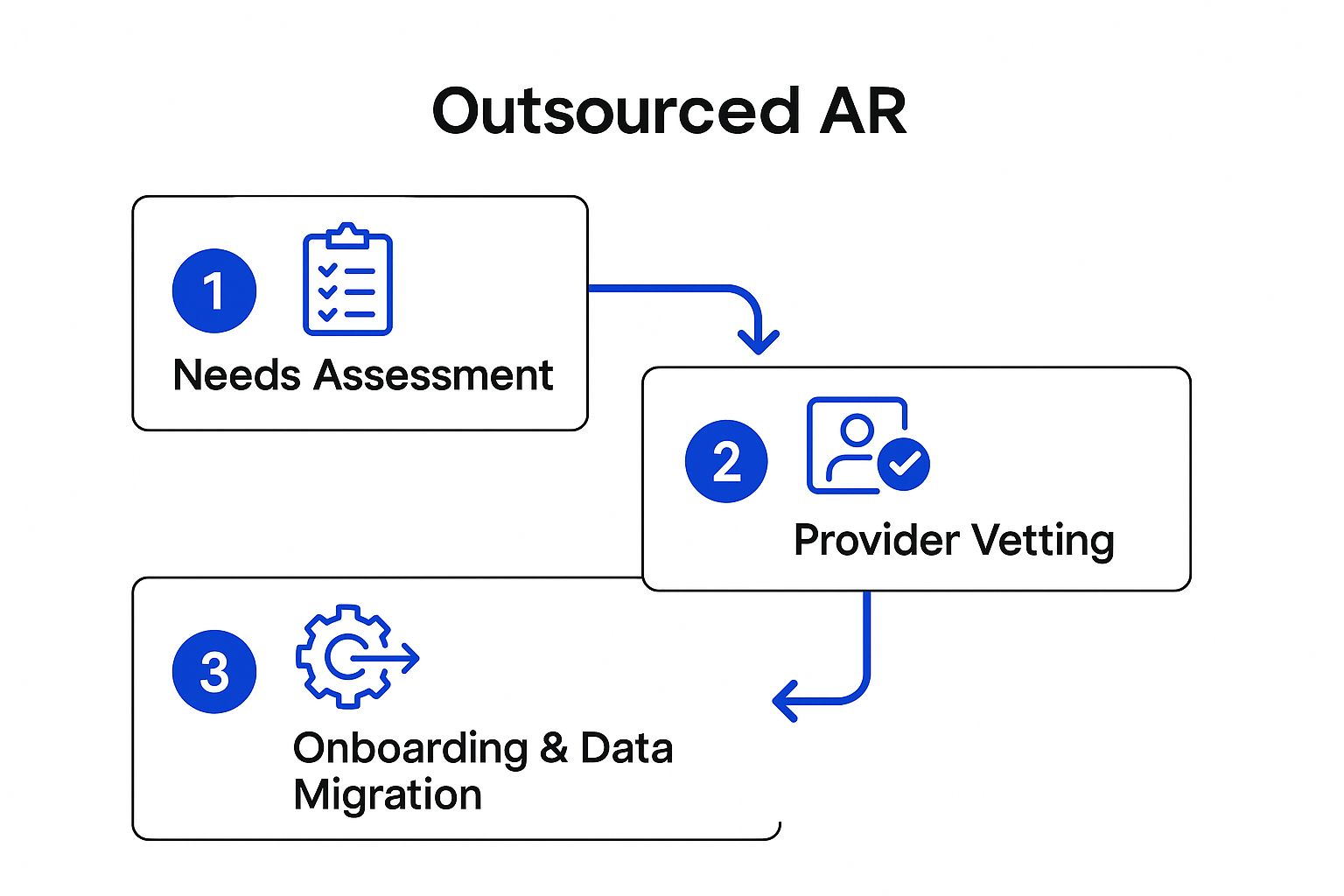At its core, accounts receivable outsourcing is simply having a specialist firm handle your company's invoicing, payment collections, and credit control. Think of it as bringing in a dedicated team of experts whose sole job is to make sure your business gets paid on time, every time.
This strategic move lets you hand off time-consuming financial tasks, which almost always leads to faster payments, improved cash flow, and a noticeable drop in administrative headaches. It's about entrusting a vital but non-core function to a partner with the right tools and deep experience to do it better.
Unlocking Efficiency with Accounts Receivable Outsourcing

Your accounts receivable (AR) process is like the engine of your business. When it’s running smoothly, it fuels everything you do with a reliable flow of cash. But trying to manage it all in-house can be a huge drain on your resources, particularly for businesses on the rise.
Chasing late payments, reconciling complex invoices, and running credit checks all demand time and focus that you’d much rather spend on sales, marketing, or developing your next great product.
This is exactly where accounts receivable outsourcing comes into play. It’s about more than just getting tasks off your plate; it’s about plugging into a streamlined, technology-powered system built for peak efficiency. These specialist firms bring a level of focus and expertise that’s incredibly difficult and expensive to build from scratch internally.
By outsourcing AR, you're not losing control. You're gaining a strategic partner dedicated to optimising one of your most critical financial lifelines. This frees up your team to shift from tactical, repetitive work to strategic, growth-focused initiatives.
In-House AR vs Outsourced AR at a Glance
To really see the difference, a side-by-side comparison makes it crystal clear. When you manage AR internally, you’re carrying the full weight of salaries, training, software subscriptions, and other overheads. You have direct control, sure, but you often miss out on the scalability and advanced technology a dedicated provider offers.
Outsourcing, on the other hand, flips this on its head. It turns those fixed costs into a more predictable, variable expense, giving you flexibility and access to enterprise-level tools you might not otherwise afford. This approach is a cornerstone of a broader accounting and finance outsourcing strategy that helps businesses stay nimble.
The table below gives you a quick snapshot of how the two models compare.
Ultimately, choosing to outsource is about making a strategic decision to focus on what your business does best, while letting experts handle the critical function of keeping your cash flow healthy and consistent.
The Real Benefits of Outsourcing Your AR

Let's move past the theory. The decision to outsource your accounts receivable brings real, tangible results that hit your bottom line. It isn't just about handing off a few tasks; it's about giving your entire financial operation a serious upgrade. The benefits stack up quickly, touching everything from cost savings to overall business strategy.
Many businesses are surprised when they tally up the true cost of an in-house AR team. When you factor in salaries, benefits, continuous training, and pricey software licences, the numbers often dwarf the fees of an outsourcing partner. By making the switch, you trade these chunky fixed costs for a predictable, manageable expense. That’s capital you can pump back into growing your business.
This shift helps explain why the Business Process Outsourcing (BPO) market in the UK keeps growing. It's on track to hit around £25 billion by 2025, with a steady growth of about 5% each year. UK companies are actively looking for smarter, tech-driven finance solutions to get more efficient, and AR outsourcing is a big piece of that puzzle.
Slashing Your Days Sales Outstanding
One of the first things you'll notice is a sharp drop in your Days Sales Outstanding (DSO). This is simply the average time it takes for you to get paid after you’ve made a sale. A high DSO is a cash flow killer—it means your money is locked up in customers' bank accounts instead of yours.
Imagine a mid-sized creative agency in the UK with a DSO lingering over 60 days. Their finance team was completely swamped, chasing old invoices when they should have been focused on financial planning. After bringing in an AR specialist, they cut their DSO down to 35 days in just one quarter.
How did they do it? The outsourced team rolled out a proper system: automated reminders, professional follow-up calls, and an easy-to-use online payment portal. This disciplined, expert approach got cash in the door faster and gave the agency some much-needed breathing room.
When you outsource, you're hiring a dedicated team whose sole job is to collect your money quickly and professionally. Their focused expertise gets results that an overstretched internal team often can't match.
Gaining a Strategic Advantage
Beyond the immediate cash flow boost, outsourcing your AR gives you a real strategic edge. When your best people aren't bogged down chasing payments, they can finally concentrate on work that actually pushes the business forward.
This newfound freedom frees them up for more valuable work:
- Smarter Financial Planning: Your finance director can focus on forecasting and strategic analysis instead of getting dragged into collection calls.
- Happier Customers: Your sales team can build relationships without having awkward conversations about overdue invoices. The payment side of things is handled professionally and separately.
- Greater Agility: With more reliable cash flow, you can jump on opportunities—whether that's buying new equipment, hiring key staff, or launching a new product. For more on this, check out our guide on ways to improve cash flow.
At the end of the day, outsourcing accounts receivable is an investment in focus. You're bringing in experts to solidify your finances, reduce operational headaches, and let your core team get back to what they do best: innovating and growing the business. That’s where the real, lasting value lies.
How to Implement AR Outsourcing Successfully
Moving your accounts receivable to an external partner isn't something you do on a whim. Think of it as a strategic project, not just a simple handover. A successful switch is all about a clear, structured plan, broken down into manageable phases. This ensures a smooth transition that minimises disruption and starts delivering results right from the get-go.
It all begins with an honest look at your own operations, followed by a careful search for the right partner, and finally, a seamless integration of their team with yours. Get this right, and you're laying the foundation for better cash flow, a lighter administrative load, and a much healthier financial footing for your business.
The infographic below breaks down the three core stages for getting started with outsourced accounts receivable.

As you can see, a successful transition follows a logical path: start with internal analysis, move to external selection, and finish with technical integration.
Stage 1: Conduct a Thorough Needs Assessment
Before you can even think about finding a partner, you need to know exactly what you need help with. This first step is all about looking inward. Start by mapping out your current AR process, from the moment an invoice is created to when the final payment hits your account. Pinpoint the bottlenecks, the frustrations, and the tasks that are eating up your team's time.
Are you constantly chasing late payments? Is manual data entry for invoices leading to costly errors? Maybe your team simply doesn't have the time to run proper credit checks on new customers.
A detailed self-assessment is non-negotiable. It gives you the concrete data you need to write a clear brief for potential partners and sets a baseline for measuring their performance later on.
Next, get specific about your goals. What does success look like? Your objectives might include:
- Reducing Days Sales Outstanding (DSO) by a set percentage.
- Slashing the administrative hours spent on collections each week.
- Improving the accuracy of your cash flow forecasts with better data.
This is also the perfect time to think about the kind of expertise you're looking for. To get a better feel for the skills involved, reviewing a comprehensive accounts receivable job description can give you a clearer picture of what to expect from a top-tier provider.
Stage 2: Vet and Select Your Outsourcing Partner
With your needs clearly defined, the hunt for the right partner can begin. This is about far more than just comparing prices. You're looking for a provider whose culture, technology, and industry knowledge align with yours. Don't be shy about asking tough questions on their processes, security, and compliance—especially with UK regulations like GDPR.
Key questions to put to any potential provider:
- How do you handle sensitive customer communications?
- What security measures do you have in place to protect our financial data?
- Can you show us case studies from clients in our industry?
- What kind of reporting and performance dashboards will we have access to?
Always ask for a demo of their technology. A modern accounts receivable outsourcing firm should provide a client portal that gives you real-time visibility into invoice statuses, collection activities, and key performance metrics. That level of transparency is absolutely vital for building trust and maintaining control.
Stage 3: Manage Onboarding and Data Migration
Once you’ve made your choice, the final implementation phase kicks off. This is where you onboard their team and securely migrate your data. A good provider will assign a dedicated implementation manager to walk you through every step. They’ll work with you to set up communication protocols, define escalation paths for tricky collections, and establish a reporting schedule.
The data migration part is critical. You'll need to grant access to your accounting software, customer database, and the list of outstanding invoices. Your partner must have a robust and secure method for handling this transfer, ensuring total data integrity and confidentiality.
Finally, agree on a clear framework for managing performance. Schedule regular check-ins—weekly to start, then maybe monthly—to review progress against the goals you set back in stage one. This continuous feedback loop is what keeps the partnership on track and ensures it delivers the financial rewards you’re looking for.
Choosing the Right Outsourcing Partner
Picking an accounts receivable outsourcing partner is one of the most critical financial decisions you'll make. This isn't just about hiring a supplier; it's about finding a genuine partner. Think of it like choosing a co-pilot for your business—you need a team that's reliable, skilled, and understands exactly where you're headed. The success of your entire outsourcing effort hinges on making a smart, informed choice right from the start.
A great partner becomes a seamless extension of your own finance department, representing your brand with professionalism and care. The wrong one, however, can damage customer relationships, create security nightmares, and tank your financial results. That's why your evaluation process has to be thorough, focusing on a few non-negotiable criteria that separate the best from the rest.
Evaluate Industry Specialisation
The very first filter in your search should be industry experience. It just makes sense. A partner who already knows the unique billing cycles, payment terms, and communication styles of your sector will get up to speed far quicker and deliver much better results.
For example, the collections process for a SaaS company built on recurring subscriptions is a world away from a construction firm that deals with complex, project-based invoicing. Ask potential partners for case studies or, even better, to speak with references from businesses like yours. Their ability to show a proven track record in your field is a huge green flag.
A partner with deep industry knowledge won't just follow a script; they'll offer valuable insights and best practices specific to your market, helping you avoid common pitfalls and fine-tune your collections strategy.
The UK's financial services sector, which contributes a massive £208.2 billion to the economy, is a prime example of this. As this sector grows with new tech and changing regulations, the demand for specialised AR partners who understand this complex environment is soaring. This really underlines the importance of finding a true specialist, not a generalist. To get a better feel for these shifts, you can discover key insights for the UK market on billgosling.com.
Scrutinise Technology and Security
In this day and age, a provider’s tech stack is just as important as their financial expertise. A top-tier firm will use modern, automated systems to handle invoicing, send out timely reminders, and give you a real-time window into your accounts. Look for a partner that offers a clean, transparent client portal where you can track key metrics like Days Sales Outstanding (DSO) and collection progress whenever you want.
Just as critical is their commitment to data security. You’re handing over incredibly sensitive financial information, so their security protocols must be absolutely watertight. Make sure they are fully compliant with UK regulations, especially GDPR.
Key security credentials to look for include:
- GDPR Compliance: This is non-negotiable for any firm handling UK customer data.
- ISO 27001 Certification: The global gold standard for information security management.
- Robust Data Encryption: Essential for protecting data both when it's stored and when it's being transmitted.
Don't be shy about asking detailed questions about their security measures. Any reputable provider will be transparent and proud to show you the systems they have in place to protect your data.
Compare Providers with a Clear Framework
Once you've got a shortlist of potential partners who tick the industry and security boxes, it's time for a head-to-head comparison. Using a structured evaluation framework is the best way to objectively weigh the pros and cons of each option without getting swayed by a slick sales pitch.
To make this easier, I've put together a checklist of the essential factors you should consider when comparing providers.
Key Criteria for Selecting an AR Outsourcing Provider
By methodically assessing each provider against these criteria, you move beyond a simple price comparison. You’ll be in a much better position to choose a true partner who is equipped to protect your brand, boost your cash flow, and support your business goals for years to come.
The Technology Powering Modern AR

These days, accounts receivable outsourcing is a lot more than just making phone calls and sending emails. It’s a sophisticated operation built on a foundation of powerful technology that completely changes the game. It shifts collections from a reactive headache to a proactive, data-led strategy. When you bring a top provider on board, you’re not just hiring people; you’re tapping into an enterprise-level tech stack without the eye-watering investment.
Think about it like this. Managing your receivables with spreadsheets is like navigating a city with a folded paper map. You’ll get there eventually, but it’s slow, clunky, and easy to make a wrong turn. Outsourcing to a tech-savvy partner is like switching to a live GPS that automatically reroutes you around traffic jams. That’s the kind of speed, accuracy, and foresight their technology brings to the table.
The Core Tech Components
At the heart of modern AR outsourcing are a few key pieces of technology. These aren’t just shiny objects; they work in tandem to automate the grind, uncover deep insights, and ultimately, get cash into your bank account faster.
- Cloud-Based Platforms: The best providers operate on centralised cloud platforms, giving you a single, reliable view of everything. You can log in whenever you want, from wherever you are, and see real-time invoice statuses, check on collection activities, and pull up performance dashboards. No more guessing games.
- Intelligent Automation: This is where you see massive efficiency gains. Automation takes care of all the repetitive stuff—sending customised reminders, flagging accounts that are falling behind, and escalating tricky invoices based on rules you help set.
- Advanced Analytics and AI: The real trailblazers use artificial intelligence to analyse payment histories and predict which invoices are most likely to go overdue. This allows their collection specialists to focus their time and energy where it matters most, rather than just chasing the oldest debt.
The point of all this tech isn't to replace people. It's to make them better. By automating the mundane tasks, AR specialists can apply their expertise to complex situations and focus on maintaining positive relationships with your customers, even when asking for money.
This level of sophistication is particularly vital in the UK, where late payments are a chronic problem for businesses. Here, accounts receivable outsourcing in the UK uses these platforms to provide real-time tracking and reporting, which is essential when over 50% of B2B invoices are paid late. Automated reminders have become an indispensable tool for UK firms trying to improve their cash flow and cut down on admin. You can learn more about how UK firms are boosting collections on mindspaceoutsourcing.co.uk.
What This Looks Like in Practice
So, what does this technology actually do for you day-to-day? It translates into practical tools that have a direct, positive impact on your company’s financial health.
For instance, instead of someone on your team manually checking who needs a nudge, an automated system sends a polite follow-up a few days before an invoice is due. It sends another on the due date and a slightly firmer one a week later. This kind of consistent, professional communication makes a huge difference in how quickly you get paid.
Other key tools you get access to include:
- Online Client Portals: These give your customers a simple way to see all their outstanding invoices in one place and pay them instantly via credit card or direct debit. Making it easy to pay you is half the battle.
- Real-Time Cash Flow Forecasting: Using historical payment data and live invoice statuses, these systems can give you a far more accurate forecast of your cash position.
- Integrated Communication Hubs: Every email, call, and note is logged in one central place. This gives both you and your outsourcing partner a complete, transparent history of every interaction with every customer.
At the end of the day, this technology gives your business a serious competitive edge. It helps you get paid faster, cuts down on the risk of bad debt, and delivers the financial clarity you need to make smarter decisions with confidence.
Getting to Grips with AR Outsourcing Costs
So, you’re thinking about outsourcing your accounts receivable. Naturally, one of the first questions on your mind is, "What's this going to cost me?" It's a fair question, but looking at it as just another expense is the wrong way to frame it.
The real question isn't about cost, but about value. It's an investment. To figure out the return, you first need to understand how outsourcing firms structure their fees.
Most providers use one of two main pricing models. Each is built for different types of businesses – from a fast-growing start-up with unpredictable invoicing to a large, stable company with a steady rhythm. Understanding these will help you find a partner whose pricing aligns with your financial goals.
Common Pricing Models Explained
The pricing for accounts receivable outsourcing isn't as complicated as you might think. The right model for you will really depend on how many invoices you send, their average value, and whether you prefer a predictable monthly bill or a fee based purely on results.
Percentage-Based Fees: This is probably the most common setup. The provider takes a small percentage of the money they successfully collect on your behalf. It’s a powerful model because their success is tied directly to yours – they don't get paid until you do.
Flat Monthly Rate: With this model, you pay a fixed fee every month for a set list of services. It’s perfect for businesses that need to stick to a strict budget and want no financial surprises, no matter how collections fluctuate.
You’ll also find some firms offering a hybrid model – a smaller flat fee plus a reduced percentage on collections. This can be a great middle-ground, giving you some predictability while still motivating your partner to perform.
Don't get fixated on the headline number alone. A provider charging a slightly higher fee might bring superior technology and a proven track record in your industry to the table. This often translates to a far better return through quicker payments and fewer invoices being written off.
Calculating Your Return on Investment
This is where you shift your thinking from cost to value. A good AR partner doesn't just tick boxes; they actively boost your cash flow and cut down your internal running costs, delivering a real financial return.
Start by adding up what your in-house AR process truly costs you. We're talking salaries, benefits, software licences, training – everything. Be honest and thorough here.
Next, think about the impact of getting paid faster. Let’s say outsourcing cuts your Days Sales Outstanding (DSO) from 60 days down to 40. That’s 20 extra days of revenue freed up and put back to work in your business. When you add the value of reduced bad debt and the countless admin hours your team reclaims, the provider's fee starts to look very small. You’ll quickly find that effective accounts receivable outsourcing doesn't just pay for itself; it generates a profit.
Answering Your Questions on Outsourcing AR
It’s completely normal to have a few nagging questions before handing over a core part of your finances. After all, your accounts receivable is the lifeblood of your business. Let's tackle some of the biggest concerns head-on – security, control, and customer relationships – so you can feel confident about the path forward.
Think of these as the final-hurdle questions. Getting clear, honest answers is crucial for making a smart decision and building a partnership you can trust.
Is My Company Data Secure with an Outsourcing Firm?
This is usually the first question people ask, and for good reason. Handing over sensitive financial data is a big deal. The good news is that established AR outsourcing providers in the UK are held to incredibly high standards. They live and breathe regulations like GDPR and many are certified with ISO 27001, the global benchmark for managing information security.
Any firm worth its salt will be an open book about its security measures. Don't hesitate to ask them about data encryption, how they secure their physical offices, and the background checks they run on their staff. Their readiness to provide these details speaks volumes about their professionalism and their commitment to keeping your data safe.
A quality outsourcing partner functions as an extension of your brand, not a replacement for it. You establish the communication guidelines, the tone of voice, and the escalation protocols for overdue payments, ensuring every customer interaction aligns with your company's values.
Will I Lose Control Over My Customer Relationships?
This is a common fear, but it's largely a myth. A professional AR partner doesn't take over your customer relationships; they work within the boundaries you set to protect and even improve them. You’re still in control.
You’re the one who decides the tone of a reminder email or the script for a follow-up call. Through dedicated client portals and detailed reporting, you’ll have a clear view of every touchpoint. This ensures that even tricky conversations about late payments are handled with the care and respect your customers expect. The aim is to get your invoices paid promptly while keeping the customer relationship strong.
Is My Business Too Small for AR Outsourcing?
Absolutely not. The old idea that outsourcing is just for huge corporations is long gone. Today's providers offer flexible services that are specifically built for growing start-ups and small to medium-sized enterprises (SMEs).
If your team is losing valuable time chasing invoices when they could be driving growth, outsourcing can be a lifesaver. If patchy cash flow is holding your business back, it’s a way to bring in specialist skills and technology to get things on an even keel. It’s not about how big your business is; it’s about knowing when to bring in an expert to help you scale more effectively.

